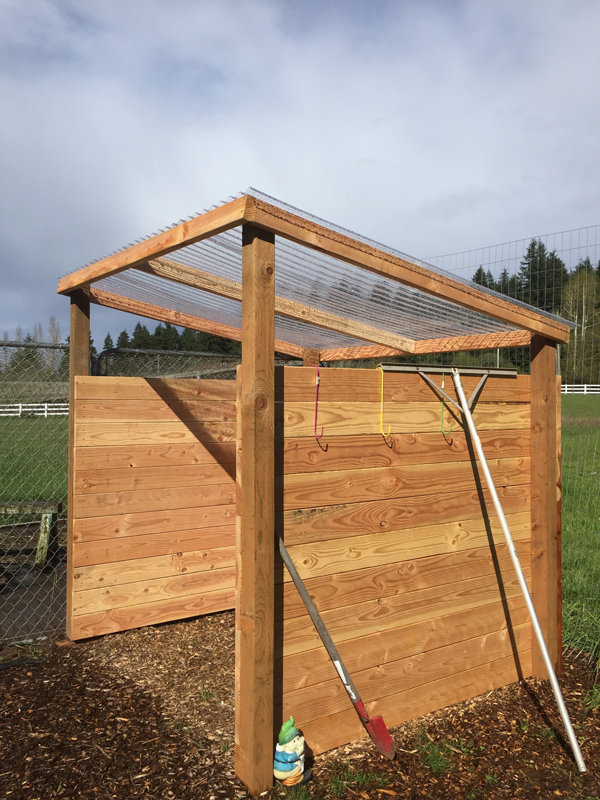[et_pb_text admin_label="byline (replace with existing module if available)" background_layout="light" text_orientation="left" use_border_color="off" border_color="#ffffff" border_style="solid" text_font="||on||" custom_padding="||0px|"]
The Shellfish Partners, Special to KP News
 Livestock owners can build a manure bin for less than $500 in materials. Courtesy Pierce Conservation District
Livestock owners can build a manure bin for less than $500 in materials. Courtesy Pierce Conservation District
Manure from a single goat can pollute Key Peninsula bays and make swimming and playing on the beach less safe and less healthy. But there’s a better way: Pierce Conservation District is conducting classes on how to build a bin to compost manure to use as fertilizer instead.
Last winter, local livestock owners got started on the quest to turn manure into potential. The farmers learned how to put together a simple bin with a roof and three walls. Each person left the workshop with a kit of materials to build their own bin. Some of the immediate benefits: less smell and fewer flies. But the longterm lesson is that composting is the most effective way to manage manure.
Farmers around the KP have now put 19 bins to work to upcycle manure and protect the environment.
“I was surprised by how much quicker and easier it was to build the bin than I had expected,” said Sil Underwood of Mayo Cove.
Sofia Gidlund, from Pierce Conservation District, found that most local livestock owners have only a few animals. Manure bins are often large and expensive—too much capacity for a hobby farmer with just a couple goats and chickens. So she developed a workshop to help farmers build a simple manure bin that costs less than $500 in materials. These bins make it easy for owners of up to two horses to manage their manure.
Manure bins help keep pollution from getting to beaches. Eating clams, swimming and playing on the beach are some of the good things about a clean beach. Tacoma-Pierce County Health Department regularly tests the water from local beaches for pollution.
Even if you don’t have horses, sheep, goats or chickens, you can still help keep the beaches safe:
To learn if you qualify for the Build Your Own Bin workshop on Sept. 9, especially for Vaughn Bay, Rocky Bay, Filucy Bay and Mayo Cove residents, contact Sofia Gidlund, Pierce Conservation District, at sofiag@piercecd.org or call 253-845-9770.
The Shellfish Partners have been at work to protect Key Peninsula’s beaches and shellfish resources since 2006. Made up of Pierce County Public Works Surface Water Management, Pierce Conservation District, Tacoma-Pierce County Health Department, community organizations and Key Peninsula residents. To learn more or to get involved, call 253-798-6470 or visit tpchd.org/shellfish.[/box]
UNDERWRITTEN BY THE FUND FOR NONPROFIT NEWS (NEWSMATCH) AT THE MIAMI FOUNDATION, THE ANGEL GUILD, ADVERTISERS, DONORS AND PEOPLE WHO SUPPORT INDEPENDENT, NONPROFIT LOCAL NEWS